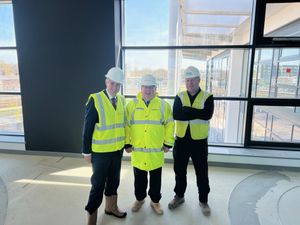Softer fall in number of permanent staff appointments in Midlands during September
Data from a newly released jobs report saw the number of permanent staff placements fall for the fourth consecutive month across the Midlands at the end of the third quarter.
The findings were made in the latest KPMG and REC, UK Report on Jobs survey, compiled by S&P Global.
The decrease was moderate but eased to the softest for three months and was the slowest recorded of the monitored English regions.
The picture for temp billings remained positive in September, though the rate of increase eased sharply to the softest in the current six-month growth sequence.
Demand for staff was muted, as vacancies for both permanent and temporary roles reduced during last month, with the latter falling into decline for the first time since October 2020.
On the pay front, permanent salary inflation gained momentum for the second month in a row and was at a three-month high. Conversely, temp pay rates fell for the first time since November 2020.
Recruiters across the Midlands continued to record an increase in starting salaries in September,stretching the current sequence of uplifts which began in March 2021. Some panellists mentioned that the rise was due to an increase in the proportion of experienced hires.
The rate of salary inflation strengthened from the previous survey period to reach the highest since June.
The Midlands recorded the strongest salary growth of any monitored English region.
Average hourly pay for short-term staff fell for the first time in nearly four years at the end of the third quarter.
Where temp wages decreased, anecdotal evidence suggested the fall was due to an increase in the number of candidates. The rate of reduction was only fractional, however.
Kate Holt, People Consulting Partner at KPMG in the Midlands, said: “The Midlands job market shows signs of softening, with a slowdown in both permanent and temporary hiring in anticipation of the upcoming Budget.
“While the fall in hourly pay for temporary staff suggests a potential shift in the balance of power between employers and job seekers, starting salaries continue to rise which should give experienced hires the confidence to continue looking for new opportunities.”
Neil Carberry, REC Chief Executive, said: “This is a picture of a jobs market waiting for a signal. Recruiters report that projects in client businesses are ready to go, but confidence is not yet high enough to push the button.
“The market for permanent roles was down but at the slowest rate since June in the Midlands and there was the sixth successive monthly rise in temp billings.
“Pay continues to moderate across the country and is now below its long-term trend. This should add to the willingness of the Bank to become more activist on interest rate cuts, as the Governor hinted last week. This would be a big boost to business.
“But eyes are also on the government. The Chancellor has a huge opportunity at the Budget to drive confidence in our economy. Firms want a clear industrial strategy that goes beyond a sector-by-sector approach, focusing on key growth enablers such as the workforce, infrastructure, access to capital, and the tax system. They also need clarity on the changes to employment law that are planned – as uncertainty in this area is also slowing employer confidence right now.”




